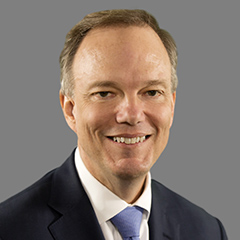Over the past year, staff from all quarters of Mathematica have engaged in a process to answer one question: Where are we going?
Mathematica’s mission is to improve public well-being through better use of data and evidence, and that mission isn’t changing. But as we contemplated the most pressing challenges facing humanity now and in the future, we plotted a course to best deliver on that mission in a world that is changing.
After focus groups, an all-staff survey, and discussions with our board of directors, I’m pleased to share our vision for Mathematica’s next 15 years.
“In 2035, Mathematica is shaping an equitable and just world in which evidence drives decisions for global impact.”
Throughout 2021, I’ll explore our vision in greater detail, including some steps we are already taking together with our clients and colleagues in the field to make this vision a reality. To get started, let’s briefly examine some of the key ideas and themes embedded in the statement above, starting with the final word, impact.
Impact. Our mission to improve public well-being calls us to improve people’s lives. We do so by providing timely, relevant evidence that drives better decisions. We also recognize that it’s not enough to just generate insights using the highest quality data and methods—we need to help decision makers understand the implications of those insights for guiding decisions that improve public well-being.
Shaping a world. We look to advance a world where data and evidence drive all decisions. We work with leaders across sectors so that they can infuse evidence-based decision making into their leadership practices. As a nonpartisan organization, Mathematica is committed to remaining rigorous and objective in our approach to building evidence. At times it might be uncomfortable to advocate for evidence and for impartial, objective analysis. However, at a time when viral disinformation can lead to not only ineffective public policy but also violence and threats against our democracy, it is incumbent on us all to be missionaries on behalf of facts, science, and evidence writ large.
Equitable and just. In the face of injustice, remaining objective does not mean remaining silent. Addressing inequality and injustice has always been important to Mathematica’s work, as we seek to understand how unequal policies, structures, and systems lead to less access to higher education, income, and other resources. But we can and will play a more direct role in understanding the causal mechanisms that lead to inequality and in identifying the mechanisms to undo that harm going forward, as we center more of our projects on measuring and promoting equity. Ultimately, we envision that our evolving work and influence will contribute directly to a more equitable and just world.
Decisions. In 2019, we changed our name from Mathematica Policy Research to Mathematica. One reason for the name change was a recognition that the people and organizations driving positive change are not exclusively decision makers in the public sector. We continue to work with creative, passionate, and driven leaders in federal, state, and local government. But today, we have a rich diversity of partner organizations, including foundations, local community-based nonprofits, hospitals, universities, and commercial entities. All of these organizations make decisions that affect people’s well-being, and to have the biggest impact, we must work together to uncover evidence that drives action and to promote the use of evidence in all decisions that impact people—whether individually or on a global scale.
Global. COVID-19 has provided a vivid illustration of our interconnected world. If we want to see an impact from addressing a pandemic, income inequality, or climate change—all challenges that do not recognize national borders—we must continue to work with partners around the world to promote the use of evidence to improve well-being globally. Over the last decade, as we have worked in more than 50 countries across Africa, Asia, and Latin America, we’ve seen incredible leaps in the use of data and technology. These advancements help programs innovate, help implementing partners scale solutions, and help funders focus their investments to maximize impact. We look forward to playing our part in extending the reach of the global evidence community.
Although this vision describes what we at Mathematica aspire to be in 2035, a strong foundation is already visible today. In the face of a pandemic and economic recession, we have seen a surge in demand for effective solutions based on reliable, timely information. Going forward, the flexible and collaborative nature of partnerships formed during the pandemic will undoubtedly be a permanent feature of how we work with a global community that is equally passionate about addressing urgent challenges.
We’re excited to chart this new course, and I look forward to sharing our progress as we strive to shape an equitable and just world in which evidence drives decisions for global impact.



